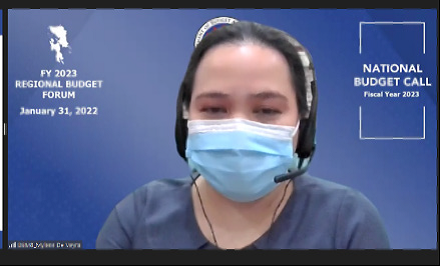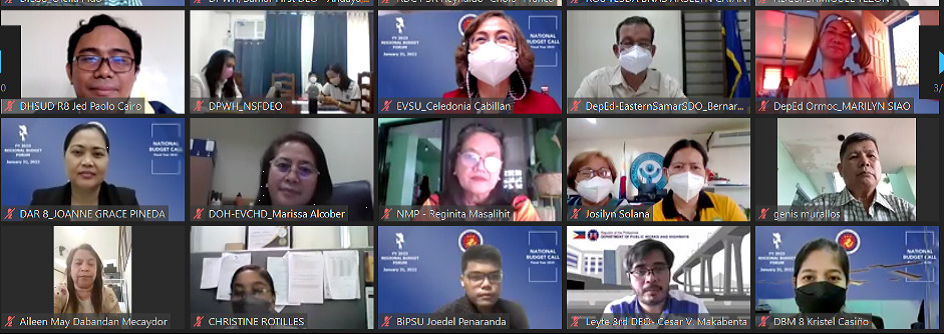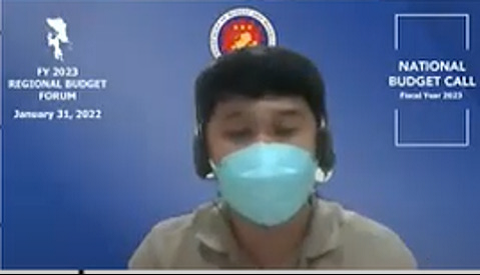The issuance of the National Budget Call for FY 2023 under National Budget Memorandum (NBM) 142 marks the start of the budget preparation phase in the whole bureaucracy. And to have a common understanding on its provisions, particularly in ensuring implementation readiness of budget proposals, the Regional Development Council (RDC) of Eastern Visayas, thru its Technical Secretariat, leads the review and endorsements of agency budget proposals with active participation from RDC members, including the Department of Budget and Management (DBM) Regional Office VIII and the National Economic and Development Authority (NEDA).
The DBM OCHO held various activities to better prepare the FY 2023 budget.
1. REGIONAL PLANNING FORUM
Headed by Regional Director (RD) Laceras, the DBM OCHO was the brains behind the conduct of the first-ever Regional Planning Forum (RPF) last January 21, 2022 which was approved by the Inter-Agency Task Force on Planning and Budgeting during the 1st Organizational Meeting last December 7, 2021.
The RPF aims to instill the importance of planning-budgeting linkage and ensure that what agencies propose in the next fiscal year are those pre-identified priority programs, activities, projects (PAPs) encoded in the Public Investment Program (PIP) and Three-Year Rolling Infrastructure Program (TRIP) for FY 2023-2025.
The NEDA hosted the forum, and discussions focused on regional thrusts and priorities, as well as the RDC Budget Review Guidelines. To guarantee that projects are ready for implementation, RD Laceras discussed procurement planning and its relationship to the budgeting process.
During the event, the RDC Google Drive was launched. Through this tool, agencies can submit their budget proposals and other information. All stakeholders such as the legislators in the region, civil society organizations (CSOs), students, beneficiaries, and private sector representatives (PSRs) in the RDC can view and submit their comments, making it the platform for the required consultation process under the Budget Call.
2. REGIONAL BUDGET FORUM
Last January 31, 2022, the Regional Budget Forum was broadcast live for the first time via Facebook. It was attended by 306 participants composed of financial and planning practitioners headed by University Presidents of 10 state universities and colleges, regional directors and heads of implementing units (IUs)/district engineering offices of the Department of Education (DEPED), Department of Public Works and Highways (DPWH), Department of Health (DOH), Technical Education and Skills Development Authority (TESDA), Commission on Higher Education (CHED), RDC VIII members-Regional Line Agencies, and the Chief of Staff of the Legislative District Headquarters of Region VIII.
Dir. Laceras said that the national budget will continue the Administration’s efforts to recover from the COVID-19 pandemic, as well as adapt to a revitalized post-pandemic environment, among other important goals. For its part, the DBM Ocho ensures the efficient and effective allocation and immediate utilization of limited government resources.

“Government budgeting enables the government to plan and manage its financial resources to support the implementation of various programs and projects that best promote the development of the country. The DBM continues to advance institutionalization of good governance at all levels in the region,” she said.
TECHNICAL SESSIONS
TOPIC 1: TWO-TIER BUDGETING APPROACH (2TBA)
Supervising Budget and Management Specialist Mylene G. De Veyra discussed the Guidelines for the 2TBA.
She also reiterated the implementation-readiness P/A/Ps and the change from last year’s budget call concerning the expanded/new Information and Communication Technology (ICT) P/A/Ps which do not require approval from the MITHI Steering Committee.

Topic 2: IMPLICATION OF THE DEVOLUTION PROCESS TO THE TIER 2 - FY 2023 BUDGET PROPOSALS
Chief Budget and Management Specialist Juvy A. Lobedica discussed the implications of the devolution process to the Tier 2 – FY 2023 Budget Proposals in two parts: (1) Continued Implementation of Reforms in the FY 2023 Budget; and (2) Status of Submission and Evaluation of National Government Agency Devolution Transition Plans. She also gave a brief overview of the Supreme Court’s Mandanas-Garcia ruling and the subsequent issuance of Executive Order No. 138.
Her discussion emphasized the need to focus on delivering capacity development and monitoring functions to LGUs rather than duplicate devolved functions and services to the LGUs, as well as the move to address developing national program concerns in line with devolution transition strategies. She also covered the status of submissions of NGA DTPs.

TOPIC 3: CHANGES AND UPDATES IN FY 2023 BUDGET PREPARATION
Mr. Emilio M. Albos III, Supervising Budget and Management Specialist/OIC-Chief Administrative Officer, discussed the changes and updates in the FY 2023 Budget Preparation (BP), including the 22 BP Forms. He identified forms that were often not accomplished properly due to common errors and were not submitted by agencies.


He also covered recent legal bases and issuances on specific concerns such as the Collective Negotiation Agreement (CNA) incentive per Budget Circular No. 2021-3, and the payment of longevity pay per the Magna Carta Benefits of Science and Technology Personnel pursuant to DBM-DOST J.C. No. 1, s. 2013. He ended his discussion by presenting the reference for the ICT expenditures.

TOPIC 4: FY 2023 BUDGET PREPARATION CALENDAR
Ms. Maria Rina P. Ygaña, Accountant III, discussed the FY 2023 Budget Preparation
Calendar, including stakeholder engagement in which departments and agencies are tasked to partner with CSOs and other similar organizations as they prepare the agency budget proposals.
“Consultation with the RDC is necessary to ensure that regional needs are considered in the national plan and budget,” she said. Ms. Ygaña emphasized the importance of coordination between Agency Central Offices (ACOs) and Agency Regional Offices (AROs), and encouraged agencies to prioritize and finish encoding of data in the OSBP before the deadline.

TOPIC 5: FY 2022 FUND RELEASE – National Budget Circular (NBC) No. 587
Ms. Liberace N. Limsiaco, Chief Budget and Management Specialist, discussed the details of the FY 2022 National Budget per NBC No. 587 which was issued to set the guidelines on its release. She then discussed the NBC’s content, highlighted each item, and explained the importance of the same. She also stressed the value of preparing agency reports submitted through Unified Reporting System (URS) since these are used as basis for the release of funds to agencies.
Ms. Limsiaco also advised the attendees that, due to a large number of Congress Initiated Projects (CIPs) for FY 2022, agencies must submit their request for clearance to the Office of the President at least during the first or second quarter of the year.
“As we prepare the FY 2023 Budget, we are likewise executing our FY 2022 Budget,” Assistant Regional Director Aleli N. Hernandez said in her closing remarks.

3. INTER-AGENCY TASK FORCE ON PLANNING & BUDGETING
Last February 7, 2022, the IATF on Planning and Budgeting, created by virtue of RDC
Resolution No. 48 series of 2021, met for the second time to facilitate the review of AROs/ SUCs budget proposals before presentation to the RDC Sectoral Committees and Full Council for possible endorsement to Agency and DBM Central Offices. The Task Force is composed of:
Chairperson: RDC VIII Co-chairperson
Co-chairpersons: NEDA VIII RD and DBM VIII RD
Members: RDC VIII Seccom Chairpersons, Co-chairpersons, CHED RD, Technical Team from NEDA, DBM, and CHED
The IATF on Planning and Budgeting was the idea of RD Laceras which she proposed in 2021. It was duly supported by the IUDC and eventually approved by the RDC Full Council. It intends to ensure connectivity of the regional plan documents containing priority PAPs to the budget process. The Task Force with the assistance of the technical teams from NEDA, DBM, and CHED will assess the agency proposals
in terms of the following:
- Responsiveness to the TRIP, RDP, RDIP, and
- AIP;
- Implementation Readiness;
- Absorptive Capacity thru the BUR; and
- Ranking of priority PAPs by agencies.

